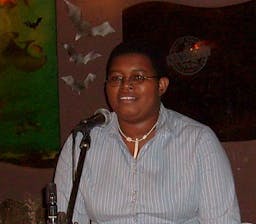A Woman's Voice
Jan 21, 2015
First story
A few months ago, I wrote an article that discussed identity: The Portrait.
It was spawned by a memory of my late brother who taught me two very important lessons.
- I am who I am, a female, a girl growing into a woman, and there is nothing shameful about that.
- I have a voice and I should use it to build myself and help my society.
The response I got from those who read was minimal. So I decided to just go out and ask it:
Is the African Woman’s Voice important? How can she make sure it is heard? And in what areas especially is it important for her voice to be heard?
What is your perception of a woman’s voice? Is it a nagging, overaggressive voice? If not, what is it?
One person immediately commented and declared that the Woman’s voice has an impact, has always been heard, and does not need to change or to compete with the man’s voice.
I agree only just partly. A woman’s voice does have an impact. She has been a mother to great and small men, good and terrible ones, too. She has been a sister, daughter, wife to these men. She helps them, whether actively or indirectly to make decisions. She is a part of their life. But has she always been heard?
Ramah Nyang, a radio journalist said, “Yes, she has, though that’s a very general statement. In urban Kenya, it is a more or less foregone conclusion. In rural Kenya, it is quite the opposite. I’ve been to villages where women are literally captive to choice of their often drunken, morbidly conservative other halves.”
I suppose in most African urban societies, the woman’s place as a breadwinner, policy maker and leader is recognised and respected. As noted by Ramah, the woman in rural areas is held captive to a man’s choice, which makes her vulnerable to abuse, HIV infection and limits both hers and the society’s economic success.
But does that really mean that the urban woman’s voice really makes an impact and in the right way?
Simiyu Barasa, a writer and filmmaker had this to say, “A woman’s voice needs to be heard, and yet because her voice is so powerful, societies have invented ways of muffling it. Different societies have different ways of doing this, so different societies need different ways of tackling this denial of women’s right to live a full life.”
Yes, the urban woman’s voice has more strength, but the urban society adjusts itself on ways to muffle it. The woman is frustrated by finding herself a lone parent with a single income in a lot of cases. The woman finds herself earning less than her counterparts. The woman has to struggle more than her counterparts to get recognition for her work. And the woman, having been socialised by repetitive circumstances, limits herself, by giving up on her endeavours towards financial and career success, by choosing easier but less rewarding careers and investments, by hiding her voice so as to be inconspicuous.
Every woman needs to recognise the importance of her voice, to herself, to her family and to society as a whole.
The woman finds herself in nurturing roles in many instances, as a mother, grandmother, aunt, older relative, which affords her the opportunity to be actively involved in molding the characters of future leaders, both male and female. Her voice can guide, correct and assist the young ones into identifying and being comfortable with their identities, as well as using their skills and talents towards better futures, their own and the society’s.
As a policy maker, the woman is psychologically equipped, generally, to see details that can help complete the picture. If a woman can break beyond barriers, society made and self imposed, she would be a valuable member of a team, and with the right qualifications even a leader. Take a look at the women who have made it into top leadership positions, from Queen Zenobia 3rd century warring queen of Palmyra, to Margaret Thatcher, former Prime Minister of England and Martha Karua, the Minister of Justice in Kenya. They all have 3 things in common.
The courage and strength to walk into a traditionally male dominated field and make an impact in it.
The ability to strive beyond common boundaries and excel even where their male contemporaries had failed. This is sometimes not because of exceptional ability but because of the keen awareness that she must prove herself an extra mile.
Vocal and exceptional women leaders are humans, too. They make mistakes, elicit dislike and hate from that, or lose their empires all together. We notice more, because they are women.
And yet, without her voice, society is not. Ramah puts it like this, “The distinction lies in asking whether say, Caroline Mutoko (A very vocal and successful radio presenter) needs to speak out, as much as say, Atieno over in Homa Bay district with a drunken husband (who infected her with HIV I might add), needs to.”
Ramah concludes, “Sure, your species nags, and whines, and complains about things that I find perfectly normal (like a guy’s obsession with soccer or cars), but the bottom line is this; - its part of who you are and that’s what makes your species not only important, but special.”
© Juliet Maruru 2009 www.jmaruru.wordpress.com




